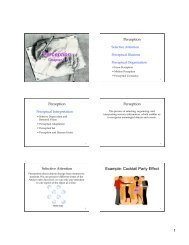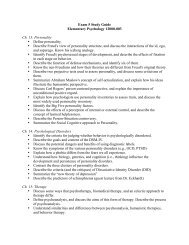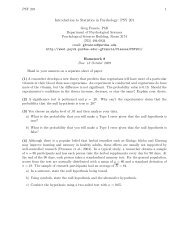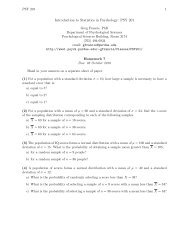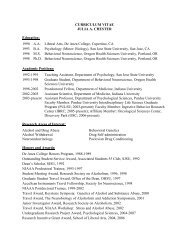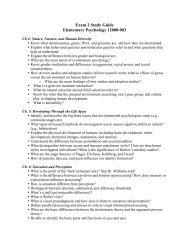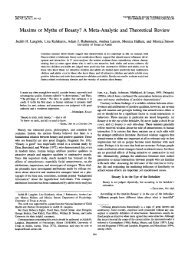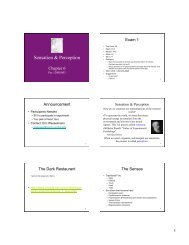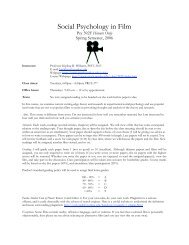Introduction to Cognitive Psychology - Department of Psychological ...
Introduction to Cognitive Psychology - Department of Psychological ...
Introduction to Cognitive Psychology - Department of Psychological ...
Create successful ePaper yourself
Turn your PDF publications into a flip-book with our unique Google optimized e-Paper software.
Pr<strong>of</strong>essor Greg Francis 8/15/12OvergeneralizationsWe know this is the most difficult part <strong>of</strong> language because adultsmake the same kind <strong>of</strong> mistakes tread - trod strive -strove dwell - dwelt slay-slew rend - rentsmite - smoteSound weird because we do not <strong>of</strong>ten hear them many adults regularizethe words treaded, strived, dwelled,slayed, rended, smited thus language changes…!Purdue UniversitySyntax errorsChildren make similar mistakes in applyinggrammatical rulesIn English there is a causative rule that applies <strong>to</strong>some verbs and not others takes a verb meaning <strong>to</strong> do something and converts it <strong>to</strong> averb meaning <strong>to</strong> cause <strong>to</strong> do somethingThus you can say The butter melted. --> Sally melted the butter. The ball bounced. --> Hiram bounced the ball.But you cant say the second <strong>of</strong> each pair I like sausage. --> I am liked <strong>of</strong> sausage. I giggled. --> Sally giggled me.Purdue UniversitySyntax errorsChildren over generalize application <strong>of</strong> the causativerule <strong>to</strong> inappropriate verbs I go <strong>to</strong> the bathroom. --> Go me <strong>to</strong> the bathroom. Aunt Jane died. --> The tiger will come and eat David andthen he will be died and I wont have a little brother anymore. I drink with a cup. --> Yawny Baby - you can push her mouthopen <strong>to</strong> drink her.Many <strong>of</strong> these errors would be fine in other languages!The situation is similar <strong>to</strong> the special past tense verbs This rule must be memorized as applying <strong>to</strong> some verbs andnot othersSyntax errorsAdults also misapply the causative rule Sparkle your table with Cape Cod classic glass-ware. Well, that decided me. This new golf ball could obsolete many golf courses. If she subscribes us up, shell get a bonus. Boiler up!Childrens errors tend <strong>to</strong> track the more difficultaspects <strong>of</strong> a language, relative <strong>to</strong> other languages Adults make the same kinds <strong>of</strong> mistakes for still more difficult<strong>to</strong> remember casesPurdue UniversityPurdue UniversitySecond languageIt is difficult (and rare) for an adult <strong>to</strong> becomefluent in a second language children do it easilyWhat accounts for the difference? most likely it is age there seems <strong>to</strong> be a critical period during whichlanguage can be learned beyond age six (or so) it becomes more difficult <strong>to</strong> learna language (first or second)Second languageHigh school and college (or later) is just about theworst time <strong>to</strong> try <strong>to</strong> learn a second languageIt should be in kindergarten or preschoolImmigrants who arrive after age 6 may never fullylearn a second language Children who fail <strong>to</strong> learn any language by age 6never do they might create a pidgin <strong>of</strong> some sortPurdue UniversityPurdue UniversityPSY 200: Intro. <strong>to</strong> <strong>Cognitive</strong> <strong>Psychology</strong> 4





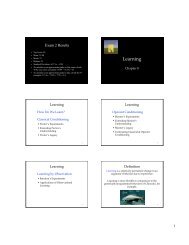
![Exam 4 Study Guide[1]](https://img.yumpu.com/45196739/1/190x245/exam-4-study-guide1.jpg?quality=85)
